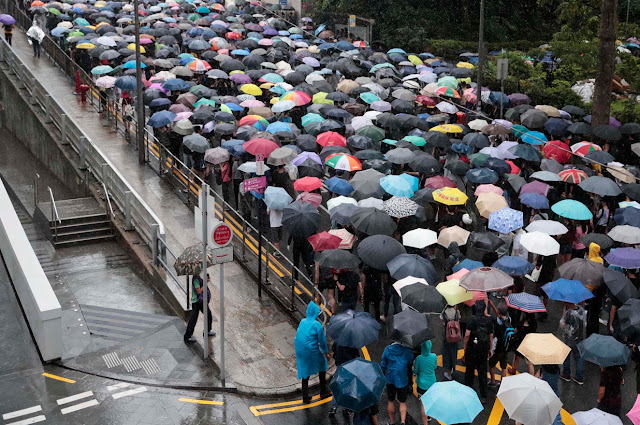International News - Beijing can’t stop Hong Kong’s thirst for freedom
Beijing can’t stop Hong Kong’s thirst for freedom
By Elisha Maldonado, New York Post, September 27, 2019
Pro-democracy protestors walk with umbrellas in Hong Kong, AP photo
Hong Kong on Saturday will mark the fifth anniversary of the Umbrella Movement with yet another protest, one that the Hong Kong police say they’ll allow after having previously banned it.
It’ll be a key moment in what has been months of unrest.
What’s driving the massive discontent? In a word, freedom.
“We can’t live in a society where people like [Chinese activist and Nobel Peace Prize winner] Liu Xiobo could be arrested and die in jail,” says Bonnie Leung, vice-convenor of Hong Kong’s Civil Human Rights Front, the group responsible for organizing three of the summer’s biggest protests.
The people of Hong Kong have been sending the Chinese government a loud message: We don’t want what you’re peddling. We want freedom and democracy.
Two weeks ago, thousands of protesters draped themselves in British and US flags, played the Star-Spangled Banner and held signs begging for our help. It was a sight to behold.
“Fight for freedom, stand with Hong Kong,” they shouted as they marched near the US consulate. “Resist Beijing, liberate Hong Kong,” the posters read. “President Trump, please liberate Hong Kong.”
America should answer that call with all the moral and diplomatic support we can muster — and work double-time to ensure democracy and human rights in Hong Kong.
“There’s a new urgency,” Leung tells me. This is why the people have turned out in droves. Leung’s Civil Human Rights Front is behind the peaceful protests on June 9, June 16 and Aug. 11 that brought out millions.
Until now, Hong Kong enjoyed much freedom and democratic rule. That was a precondition for its return to China from Britain in 1997. The 1984 Sino-British Joint Declaration, signed by the UK’s then-prime minister, Margaret Thatcher, and then-Chinese Premier Zhao Ziyang, guaranteed Hong Kong’s autonomy.
The Beijing-selected local government is fundamentally violating that pact. Residents fear they’re losing the political system they inherited from Britain, a system they know and trust.
They also know China’s system, Leung says — and they are scared to death of it. Thus, the urgency.
Another big protest is scheduled for Oct. 1 — the 70th anniversary of the founding of the People’s Republic of China, a holiday for Communism.
Hong Kongers worry that police might ratchet up the violence during that time because the Chinese government doesn’t want discontent to sour the occasion.
On Wednesday, Carrie Lam, the Beijing-backed chief executive of Hong Kong, penned a New York Times op-ed in which she professes to understand the needs and desires of the people.
She says she “condemns” the violence, arguing that “violence is not among the actions or values that most people associate with Hong Kong, which has a reputation as a safe and welcoming city.”
Be wary. This is coming from the same woman who for months refused to withdraw the extradition bill — “out of our clear conscience, and our commitment to Hong Kong” — that started the chaos in the first place.
And it smells like a bid to tamp down turnout for the Oct. 1 protests.
Still, the question has to be asked: Why should anyone trust that police will refrain from forcefully suppressing protesters, after four months of police brutality?
This week, nearly 50 more people were arrested, bringing the total since the start of the protests to over 1,500. A new Amnesty International investigation reported an “alarming pattern” of the Hong Kong Police Force using reckless tactics, even torture, against protesters while in custody.
“The evidence leaves little room for doubt: In an apparent thirst for retaliation, Hong Kong’s security forces have engaged in a disturbing pattern of reckless and unlawful tactics.”
Leung wants to make something else clear, too: China smears Hong Kong’s protesters as violent, labeling them “terrorists” and “cockroaches.” Yet these people are merely acting in self-defense. “We have to protect our homes and our livelihoods.” People are being “beaten up and have nowhere to go.”
They’re desperate. “How can you expect us . . . not to fight back?”
A sympathetic world should wish them luck — and offer whatever help it can.
Elisha Maldonado is a member of The Post editorial board and a senior fellow for the Independent Women’s Forum.
Be sure to Recommend this page and to follow
The Bull Ring at






Comments
Post a Comment